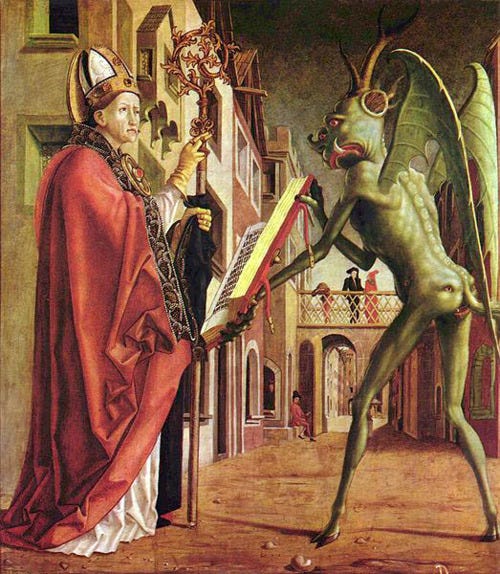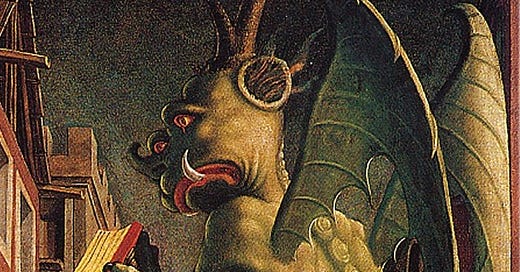
We’re continuing to look at ghosts in church history into November.
In De anima, Tertullian acknowledges the extensive literature about ghosts, but rejects it as a “fraud.” He has specific pagan lore in mind: the idea that some could “call back from Hades the souls of those who are sleeping out their destined time, those who died through violence and those deprived of burial.”
His explanation reveals just what the early Church made of these encounters--they were demonic:
What are we to say, then, of these pretensions of magic, except what everyone says—that it is a fraud. Christians are the only ones to see through this fraud, since we have come to know the evil spirits, not, of course, by consorting with them, but by the knowledge that unmasks them; not by trying to solicit their assistance, but by a power which subjugates them. Thus do we deal with that universal pollution of the human mind, the inventor of all falsehood, that plunderer of the soul’s salvation. By magic, a second form of idolatry, the demons pretend to be dead men [come to life], just as in ordinary idolatry they pass themselves off as gods. And that is reasonable, since the gods are dead. [De anima, 57]
Tertullian specifically cites the aoroi and the biaiothanatoi in this section as spirits to whom people pray. Aoroi were those who died in youth. Biaiothanatoi were those who died violently. Both were invoked by people to bring harm to enemies. The idea was that their untimely or violent deaths made them thirsty for revenge on the living.
This is where Tertullian gets interesting, because although he dismisses the notion of spirits of the dead being summoned by magic to get vengeance on the living, he does allow demons a similar power:
The demons inhabit those souls especially in whom they used to dwell when they were alive and whom they drove to this kind of untimely end. We have already suggested that every man is attended by a demon and many are aware that sudden and horrible deaths, which usually pass for accidents, are really work of demons.
And, I think we can prove that the evil spirit tries to deceive us by hiding in the persons of dead men, from the facts that come to light in exorcisms. We know that the demon tries to pose as a relative of the person possessed, or sometimes as a gladiator or as a fighter of the beasts, or even as a god. And, in this, his object is always to disprove what we are here affirming, namely, that all souls go down to Hell at their death, and to weaken our faith in the Judgment and Resurrection. Yet, the Devil, after trying to deceive the bystanders, is overcome by the power of Divine Grace, and at last, much against his will, admits that he is an evil spirit.
I have to pause here to explain Tertullian's use of the word "Hell." He believed that only the great saints went straight to heaven. Everyone else went to "Hell" until the resurrection. Clearly, this is not an orthodox view (there's a reason Tertullian is a Church Father but not a Saint), but what Tertullian is describing as "Hell" functions somewhat like Purgatory. Souls wait in Hell for the Second Coming, when they will get their reward (heaven) or punishment (damnation).
Tertullian goes on to explain another trick of the devil, in which he “brings back the souls of the dead and exhibits them to view.” This is a more effective deceit, since it offers the witness a visual stimulus: namely, the physical form of the deceased, which the devil has possessed. As he says, “it is easy to deceive the eyes of a man whose mind is so easily taken in.”
Intriguingly, he says that “even now” (in his lifetime) the followers of Simon Magus are attempting to use magic to bring back the “Prophets from Hell.
Like other Fathers, Tertullian grants the devil one great power: the power to deceive. It’s the same power wielded by the Witch of Endor, but it is only the power of lies. “God forbid we should believe that any soul, much less a Prophet, could be called forth by a demon.” What Saul saw, therefore, was a demon in disguise, not Samuel.
This seems to contradict the previous passage, where he suggests that the devil can bring back the souls of the dead to exhibit for view. Though he's not particularly clear here, he seems to saying the devil does have a measure of control over the souls he has possessed, but that souls cannot be "called forth" by a mere demonic or magical agency. He also appears to distinguish between those who died peacefully in their own time and the aoroi/biaiothanatoi. (Clarifying this point is difficult because my two translations contradict each other, and I find several passages in the original Latin confusing.*)
Tertullian concludes by addressing dreams of the dead. This has unsavory connotations for him since the pagans practice such things as incubation (sleeping on graves), which is deeply offensive. Thus, he rejects the idea with an explanation that a modern skeptic would embrace: “These things are not real because they are seen, but because they are fulfilled. A dream is true because it works out, and not because a vision is seen.” Essentially, the fulfillment of the vision makes the dreamer believe he has been contacted by the dead with a prophetic utterance.
The basis of all his theology is the story of Dives and Lazarus, which closes on the door on the notion of people returning from the afterlife. Any apparitions people claim to witness, therefore, is due to the work of the devil or “the trickery of magicians.”
*Esoteric language point: I was a C-student in Latin, which means I don't like to rely on my own translations of difficult passages. The sentence in question reads "Publica iam litteratura est quae animas etiam iusta aetate sopitas, etiam proba morte disiunctas, etiam prompta humatione dispunctas euocaturam se ab inferum incolatu pollicetur." Arbesmann/Daly translate "etiam prompta humatione dispunctas euocaturam se ab inferum incolatu pollicetur" as simply "those deprived of burial," while Thelwall renders it as "had even been buried with full rites and proper ceremony." Those are, I'm sure you'll agree, completely opposite translations, but I think Thelwall has it right.




